Blog Posts Tagged Heat Transfer Module

Thoughts on AI and CEM43 in Medical Device Design
Let’s take a look at the synergy between AI and the COMSOL Multiphysics® software, highlighted by implementing CEM43 thermal dose calculations in the software.

Modeling Refraction with the Heat Transfer Module
The Heat Transfer Module now includes specular refraction when using the Ray Shooting approach, which is useful for solving radiative heat transfer problems involving collimated sources.

Improving the Future of Geothermal Heating and Cooling with Angled Boreholes
Geothermal heat exchangers use boreholes to extract energy underground to heat and cool buildings. Learn how simulation is being used to study this process.
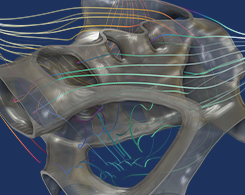
Optimization of Heat Exchangers
Developing heat exchangers is a difficult task due to their design and manufacturing costs. Explore how shape and topology optimization can be used to help.

A 3D Model Helps Scientists Predict Thermal Behavior of the Moon
A first-of-its-kind thermophysical model was built by researchers at the Physical Research Laboratory to better understand the Moon’s thermal behavior. Learn more here.

Thermal Analysis of a Czochralski Crystal Growth Furnace
The Czochralski method is the most common approach for the preparation of monocrystalline silicon crystal ingots. Learn the history behind this method and how to model it here.

Modeling Absorption and Scattering of Collimated Light
Learn a method for simulating the absorption and scattering of collimated light, which has applications in laser heating of living tissue as well as materials processing.
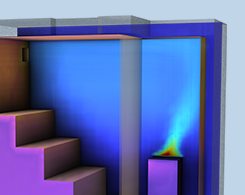
The Heat Is On: Modeling Temperature Distribution in a Sauna
How long does it take for a dry sauna to heat up? Here, we use heat transfer and fluid flow modeling to find the answer.
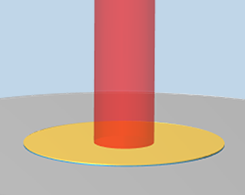
Modeling the Pulsed Laser Heating of Semitransparent Materials
Laser light is often used to rapidly heat materials within the semiconductor processing industry. Here, we explore this method with heat transfer simulation.

Intro to Modeling Transient Heating of Solids in COMSOL Multiphysics®
Transient heat transfer models are easy to set up and solve, but the interpretation of their results can lead to confusion. Here, we explore this scenario with a simple heat transfer model.

Computing Orbital Heat Loads with COMSOL Multiphysics®
As of version 6.1, the Heat Transfer Module includes a new interface for defining satellite orbit and orientation, orbital maneuvers, and varying planetary properties.
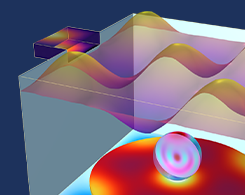
The Use of COMSOL Multiphysics® in the Food Industry
Food for thought: Explore how previously failed products and the use of multiphysics simulation inspire innovation in the food industry.
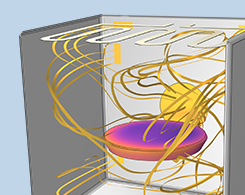
Model Balanced Heat Transfer, Bake a Better Apple Pie
Happy Pi Day! Here, we go over the best ingredient to use when preparing an apple pie, as well as how to model the heat transfer process that occurs in a pie as it is being baked in an oven.
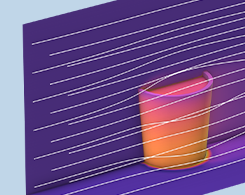
Introduction to Modeling Evaporative Cooling
From meteorology to food processing, evaporation has many industrial and scientific applications. Here, we give an introduction to modeling evaporation with the Heat Transfer Module.

Introduction to Computing Radiative Heat Exchange
Follow along as we continue our discussion on the foundations of radiative heat transfer modeling. (Part 3 of 3)

Modeling Incident Radiation in Radiative Heat Transfer
Get an introduction to modeling incident radiation on a surface with the Surface-to-Surface Radiation interface in the Heat Transfer Module. (Part 2 of 3)

Modeling Emissivity in Radiative Heat Transfer
In Part 1 of a blog series on modeling radiative heat transfer, we discuss the concept of surface emissivity.
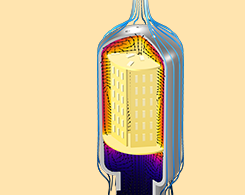
Analyzing LED Bulb Designs with Heat Transfer Simulation
LED bulbs are billed as more energy efficient than traditional bulbs, but they are not 100% efficient in turning electricity into light, making thermal management a vital design consideration.
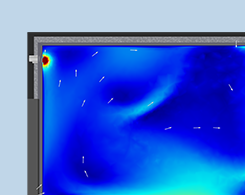
Fine-Tuning an HVAC System Design with Simulation
Do you find your office too hot, too cold, or just right? Using simulation, HVAC system engineers can assess indoor climate conditions and ensure maximum comfort among a building’s occupants.
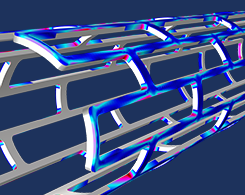
8 Uses of COMSOL Multiphysics® in the Biomedical Industry
Read about 8 real-world examples of how engineers and researchers in the biomedical industry are using simulation to advance their innovative designs.
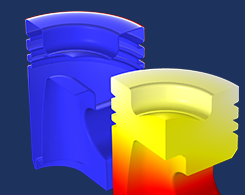
Efficient Meshing Strategies for 3D Inductive Heating Models
Interested in some efficient meshing strategies for 3D inductive heating models? In this blog post, we demonstrate how to partition a mesh based upon the element type.
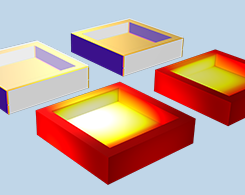
Which Radiation Interface Should I Use for My Heat Transfer Model?
Compared to the mechanisms of heat transfer by conduction and convection, heat transfer by radiation has unique characteristics. How should you account for radiation in your heat transfer models?
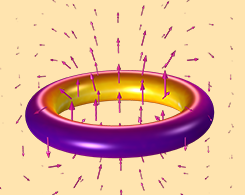
Course: Modeling Electromagnetic Coils in COMSOL®
Get an overview of our Learning Center course on modeling coils using COMSOL Multiphysics and the AC/DC Module, from setting up a coil model to analyzing electromagnetic heating and more.

Modeling Heat Transfer in Thin Layers via Layered Material Technology
We answer some questions you may have about the Layered Material functionality in the COMSOL® software: What does it do? How do you update existing models? How do simulations benefit from it?
